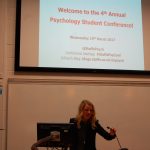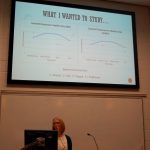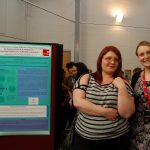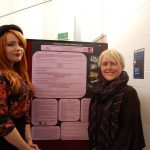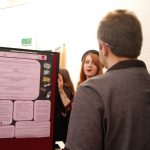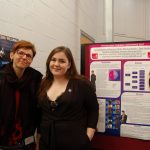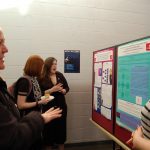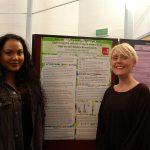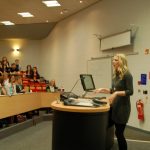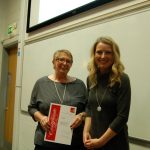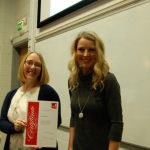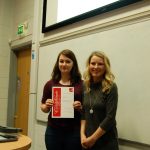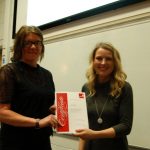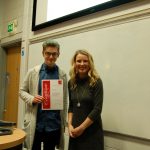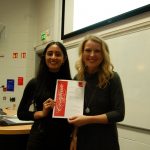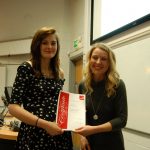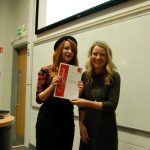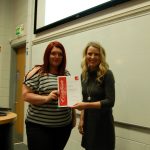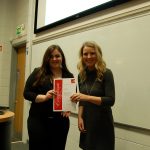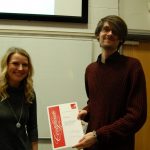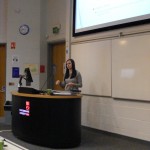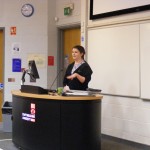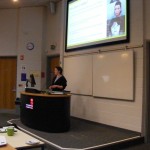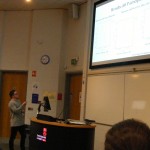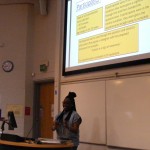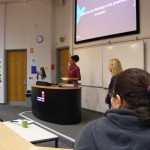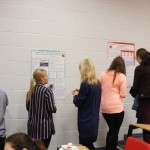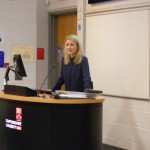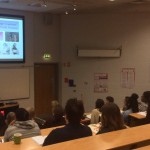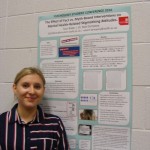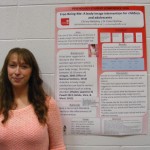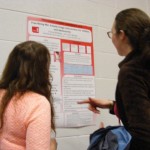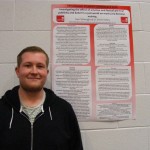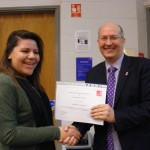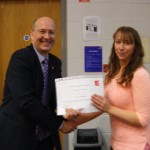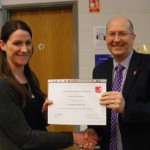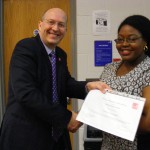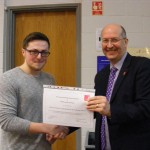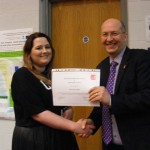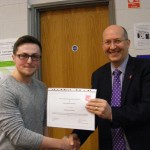
Dr Louise Humphreys opening the Conference
The Psychology department at Staffordshire University held their annual conference for current final year students to present their research findings. The conference, held in the University’s Science Centre in March 2015, featured a series of talks by current students on their research projects and included an audience of psychology students and academic staff.
The conference offered current final year students valuable practice presenting their research, and also allowed first and second year psychology students to hear about some of the research conducted by their fellow students, something which will help with developing their ideas for their own final year projects. It was great to hear our current final year students provide some valuable feedback to other students about how to manage their own projects in the future. Further details of the talks given at the conference are below:
Emily Inwards: Attitudes towards asexuality and bisexuality in young adults

Emily Inwards
Emily started the conference with a great talk about her research exploring young adults’ attitudes towards two sexualities: asexuality and bisexuality.
Emily’s talk highlighted the subjective nature of these sexualities and presented her work in a very engaging and professional manner!
Tom Barker: Where do people look when they are telling lies?

Tom Barker
Tom gave an overview of his research in progress which is using the Psychology Department’s eye-tracking equipment to get a better understanding of individuals’ eye movements when they are lying.
Dr Louise Humphreys, Tom’s project supervisor, commented “I have been impressed with Tom throughout the whole supervision process. He is very enthusiastic about his project and this came across in his presentation. Tom is a very engaging speaker and I believe he will be successful in achieving his future aspiration of becoming a University Lecturer.”
Kizzy Moss: Experiences and perceptions of having a brother or sister with Down’s Syndrome

Kizzy Moss
Kizzy presented her interview project exploring the experiences of individuals with a sibling with Down ’s syndrome. Past research has focussed on parents’ perceptions whilst the perspectives of siblings have been overlooked. Kizzy used Interpretative Phenomenological Analysis to identify a number of key themes in relation to her participants’ experiences and included issues about children taking on high levels of responsibility and mothering roles for their siblings and a need for greater acknowledgement of the types of support needed by this group.
Dr Amy Burton, Kizzy’s project supervisor, commented: “Kizzy has been a great student to supervise, she is passionate about this area of research and this enthusiasm showed in the quality of Kizzy’s presentation at the conference”.
Cheryl Hyden: Perceived barriers and facilitators to accessing university counselling by university students

Cheryl Hyden
Cheryl presented some very interesting findings from an interview study conducted with students who had accessed on-campus counselling facilities at the university. One of the novel themes Cheryl found in her interview was the role of “self-barriers” in seeking counselling support. Cheryl’s research has particular implications for counselling research and practice, particularly in understanding the reasons why some students are not accessing counselling support when they are experiencing mental health difficulties.
Cheryl commented that “taking part in the psychology undergraduate conference really helped me focus my project write up and really helped me understand my research. The morning of the conference was very nerve wracking, but I enjoyed every minute of the presentation and my confidence grew as time went on. I seriously would recommend future third year students to take part in the conference, it looks good on your CV and give you vital practice in presentations! Also you can show off your research!.”
Dr Rob Dempsey, Cheryl’s project supervisor, commented: “I was very proud of Cheryl and I thought she did a great job in presenting her research at the conference. Cheryl has been a brilliant project student and has shown a massive amount of enthusiasm in her project work. Cheryl has produced what I feel is a very strong project which has clear applications to counselling practice and improving student well-being”.
Helen Jones: Visual processing in those with a fear of spiders
Helen presented her quantitative project on the visual processing of those with and without a fear of spiders. Helen based her study on a recent journal article that showed that participants with a phobia of spiders tended to overestimate the size of a spider that they previously observed. It was suggested in this article that the study should be replicated using a non-clinical sample, which is what Helen’s project did. Although Helen had not yet analysed her data it was predicted that the results would replicate previous findings (that spider fear results in an overestimation of spider size) in a non-clinical sample.

Helen Jones
Dr Louise Humphreys, Helen’s project supervisor, commented “Helen’s project is very interesting and she did a fantastic job of presenting her research. I was particularly impressed of her awareness of some of the methodological difficulties that can occur when conducting research. Helen was very confident throughout her presentation and the talk was very engaging.”
Lauren Crilly: Perceptions of anorexia nervosa

Lauren Crilly
Lauren presented her in-progress discourse analysis of how individuals with anorexia nervosa, one of a number of clinically recognised eating disorders, talk about their issues with food.
Lauren’s research took a particularly novel approach and analysed blog posts written by people with anorexia as they discussed their own condition and issues with food.
Aimee Page: Everyday life for adults with enteral feeding

Amiee Page
Amiee presented her qualitative investigation of the experiences of people living with an enteral feeding tube. Amiee’s work involved collecting interview and diary data from her participants and analysing this using Interpretative Phenomenological Analysis. Amiee’s themes included issues relating to the value and danger of online information and support for this group. Her theme entitled “My choice or no choice” highlighted the challenging decisions people with enteral feeding need to make.
Dr Amy Burton, Amiee’s project supervisor, commented: “Amiee did a fantastic job presenting her work on the experiences of people living with an enteral feeding tube. Amiee’s project has resulted in some important learning points for health care practitioners and patients in an area that has attracted little research attention in the past. Amiee’s and the other presentations were fantastic and show how Level 6 Projects are a great opportunity to be original and create new and exciting knowledge in psychology!”
A very enjoyable conference – well done to all our presenters!
Dr Louise Humphreys, Level 6 Tutor and Conference Organiser, commented “I thoroughly enjoyed the student conference. I was very impressed with the students’ presentation skills and it was lovely to see how passionate they all are about their research. It was great to see such a range of topics and I feel that the students who attended will have gained some great ideas for their own third year projects”.
Judy David, Academic Group Leader for Psychology, commented: “The student conference was superb. The speakers were professional and confident and they did a fantastic job in explaining their project work. Without exception they delivered interesting and inspiring talks, and the passion they feel for their own research was clearly evident. I feel sure the students in the audience had lots of ideas for their own future projects, and the whole event left me feeling very proud of our great students.”
Well done to all our presenters!
For more details about the Courses in Psychology offered at Staffordshire University please click here.
 According to the Post Graduate Taught Experience Survey (PTES) 2018 results, the first cohort of students who completed the MSc Psychology Conversion course were 100% satisfied with the overall quality of their course. The Higher Education Academy’s annual Postgraduate Taught Experience Survey (PTES) is the only sector-wide survey to gain insight from taught postgraduate students about their learning and teaching experiences.
According to the Post Graduate Taught Experience Survey (PTES) 2018 results, the first cohort of students who completed the MSc Psychology Conversion course were 100% satisfied with the overall quality of their course. The Higher Education Academy’s annual Postgraduate Taught Experience Survey (PTES) is the only sector-wide survey to gain insight from taught postgraduate students about their learning and teaching experiences.




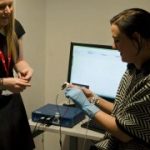

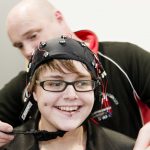

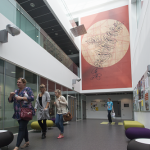


 offers a range of
offers a range of 